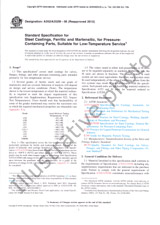We need your consent to use the individual data so that you can see information about your interests, among other things. Click "OK" to give your consent.
ASTM D5134-21
Standard Test Method for Detailed Analysis of Petroleum Naphthas through n-Nonane by Capillary Gas Chromatography
Translate name
STANDARD published on 1.12.2021
The information about the standard:
Designation standards: ASTM D5134-21
Publication date standards: 1.12.2021
SKU: NS-1045092
The number of pages: 12
Approximate weight : 36 g (0.08 lbs)
Country: American technical standard
Category: Technical standards ASTM
The category - similar standards:
Annotation of standard text ASTM D5134-21 :
Keywords:
alkylate, aromatics, capillary gas chromatography, detailed hydrocarbon analysis, DHA, hydrocarbon composition, naphtha, naphthenes, paraffin, petroleum naphtha, PNA, reformate, virgin naphtha,, ICS Number Code 71.080.10 (Aliphatic hydrocarbons)
Additional information
| Significance and Use | ||||||||||||||||||||
|
5.1?A knowledge of the hydrocarbon components comprising a petroleum naphtha, reformate, or alkylate is useful in valuation of crude oils, in alkylation and reforming process control, in product quality assessment, and for regulatory purposes. Detailed hydrocarbon composition is also used as input in the mathematical modeling of refinery processes. 5.2?Separation of naphtha components by the procedure described in this test method can result in some peaks that represent coeluting compounds. This test method cannot attribute relative concentrations to the coelutants. In the absence of supporting information, use of the results of this test method for purposes which require such attribution is not recommended. |
||||||||||||||||||||
| 1. Scope | ||||||||||||||||||||
|
1.1?This detailed hydrocarbon analysis (DHA) test method covers the determination of hydrocarbon components paraffins, naphthenes, and monoaromatics (PNA) of petroleum naphthas as enumerated in Table 1. Components eluting after 1.2?This test method is applicable to olefin-free (<2 % olefins by liquid volume) liquid hydrocarbon mixtures including virgin naphthas, reformates, and alkylates. Olefin content can be determined by Test Method D1319 or D6839. The hydrocarbon mixture must have a 98 % point of 250 ?C or less as determined by Test Method D3710 or D7096 or equivalent. 1.3?Components that are present at the 0.05 % by mass level or greater can be determined. 1.4?This test method may not be completely accurate for PNA above carbon number C7; Test Method D5443 or D6839 may be used to verify or complement the results of this test method for carbon numbers >C7. 1.5?Detailed hydrocarbon components in olefin containing samples may be determined by DHA Test Methods D6729, D6730, or D6733. 1.6?The values stated in SI units are to be regarded as standard. No other units of measurement are included in this standard. 1.7?This standard does not purport to address all of the safety concerns, if any, associated with its use. It is the responsibility of the user of this standard to establish appropriate safety, health, and environmental practices and determine the applicability of regulatory limitations prior to use. 1.8?This international standard was developed in accordance with internationally recognized principles on standardization established in the Decision on Principles for the Development of International Standards, Guides and Recommendations issued by the World Trade Organization Technical Barriers to Trade (TBT) Committee. |
||||||||||||||||||||
| 2. Referenced Documents | ||||||||||||||||||||
|
We recommend:
Technical standards updating
Do you want to make sure you use only the valid technical standards?
We can offer you a solution which will provide you a monthly overview concerning the updating of standards which you use.
Would you like to know more? Look at this page.




 Cookies
Cookies
